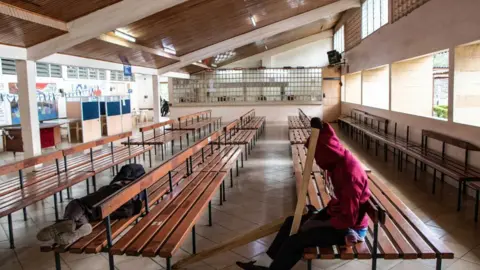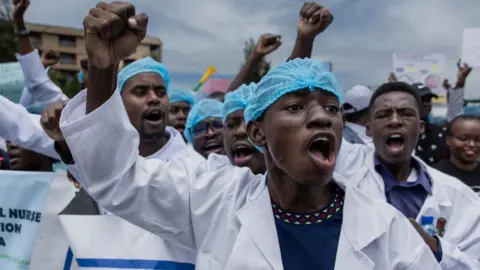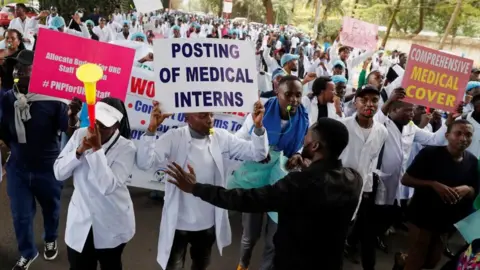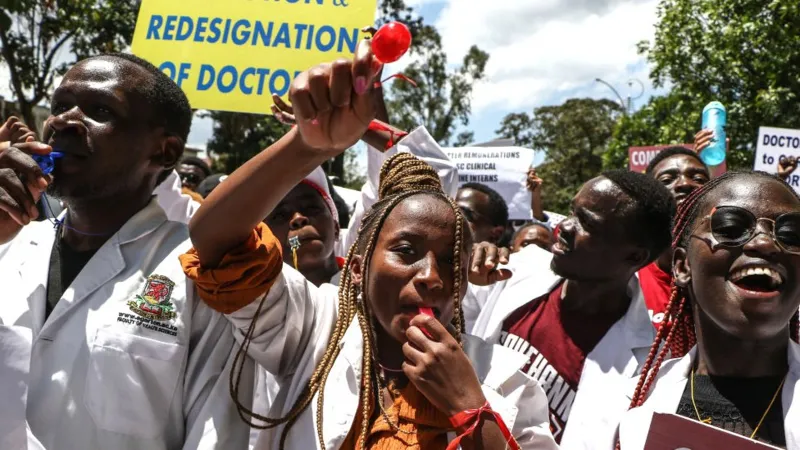Most of the beds at the labour ward of Kihara Level 4 Hospital on the outskirts of the Kenyan capital, Nairobi, are empty.
Only three are occupied out of more than a dozen.
A nurse says the hospital is not taking in women who need a Caesarean as there is no doctor to perform the operation.
The doctors here – and across the country – have been on strike for about a month now.
Public hospitals are virtually empty. There is an unsettling silence in places normally brimming with people seeking a host of critical services.
Patients are now forced to go to expensive private hospitals or delay treatment, resulting in worsening chronic illnesses and sometimes deaths.
Doctors are striking over a number of issues, including pay and the failure to hire trainee doctors, who cannot qualify without getting an intern position.
The medics are aware of the problems the strike is causing but argue that industrial action is necessary “to help the public get quality health care” in the long run, as their working conditions and the lack of equipment mean they cannot treat patients properly, says Davji Bhimji, the secretary-general of the doctors’ union, KMPDU.
“Sometimes we are just there to supervise death,” he tells the BBC.
 Getty ImagesPatients have been failing to get treatment at state hospitals in Kenya
Getty ImagesPatients have been failing to get treatment at state hospitals in Kenya
President William Ruto has asked the striking doctors to return to work and agree to the offer that the government has made, saying the country must “live according to our means”.
Many who have had to rely on the public health service are sympathetic as they have seen the problems for themselves, but that sympathy is being tested.
One woman tells the BBC that her sister-in-law, who was in labour and needed an operation, lost her unborn child because of the strike.
The patient had travelled from western Kenya, where she could not get treatment, to the main referral hospital in Nairobi, but was turned away.
She was eventually taken to a private hospital but it was too late to save her baby.
Lucy Bright Mbugua, 26, says her 10-month-old baby has been at the Kenyatta National Hospital in Nairobi since January.
Her baby is being treated for a condition that requires constant attention but only a few doctors are available. They now come around twice a week rather than daily.
“It’s painful when there is no service. The baby is suffering and there are no drugs,” she tells the BBC.
Her mother, Anne, says she often spends nights at the outpatient centre so that she is available for her daughter, and to save on transport costs.
The peasant farmer, who came to Nairobi from her rural home 200km (125 miles) away after her grandchild got sick, says she is trying to help her daughter financially but it is very difficult.
“Why can’t they sit down and agree,” she says of the striking doctors and the government, adding that “we, the small fish, are really suffering” – a view echoed by many.
 AFPThe medics say the government has reneged on a previous agreement
AFPThe medics say the government has reneged on a previous agreement
Some have been seeking solace in prayers.
A pastor in Kibera, one of the biggest slums in Nairobi, says he has been seeing about five sick people a week.
“You know that they require to be seen by doctors, but if there is no treatment, you offer prayers so that they stop having other thoughts or give up hope,” Pastor Stephen Genda tells the BBC.
The problems have now been compounded as clinical officers have joined the strike.
They provide outpatient services and constitute the backbone of healthcare, especially in rural areas. But they have vowed not to budge until their demands are met.
“The government is not going to give anything without a fight,” says Peterson Wachira, the chairman of the Kenya Union of Clinical Officers.
The government says it is paying salary arrears to doctors and has offered to hire intern doctors.
The offer followed negotiations, including court-mandated talks that involved representatives of different government departments.
But the doctors rejected it, saying the pay being offered to interns amounted to a big reduction of the amount that had been agreed in a 2017 deal.
The government set the new figure at $540 (£430) a month, but the union says $1,600 had been agreed for pay and allowances in the deal.
The authorities have been unable to hire all the trainee doctors as they say there is not enough money to pay all the prospective interns.
This has left many feeling bitter and unwanted.
 ReutersAll aspiring doctors have to spend a year as an intern before qualifying
ReutersAll aspiring doctors have to spend a year as an intern before qualifying
Micheni Mike, a graduate doctor waiting to be posted, told the BBC at the beginning of the strike that the government “does not prioritise you and the skills that you hold”.
Shirley Ogalo, a dental surgeon who is also waiting to be hired, says that graduating was a very a nice moment “but now I’m fighting”.
“You see your colleagues – the people who did other courses – they are flourishing. Some have started families. It’s depressing, it gives you a lot of frustration,” she tells the BBC.
The authorities are beginning to take a harder line.
Some of the governors heading county governments, which are responsible for the bulk of health functions, have threatened to sack the doctors.
The Council of Governors Health Committee chairman, Muthomi Njuki, has said some of the doctors’ demands were “unreasonable” and “difficult to implement”.
One public hospital in Nairobi announced last week that it was laying off more than 100 doctors participating in the strike. But up to now the health workers have vowed to stay put.
Mr Bhimji accused the government of not being “concerned about the services that we offer, otherwise if they had concerns they would be sitting down and discussing” the issues.
Religious figures and opposition leaders are among those who have called on the government to re-open negotiations with the doctors and have the hospitals back running.
But this could still drag on for months – the stoppage in 2017 lasted about 100 days.
But Ms Mbugua, who has a 10-month-old sick baby, hopes the strike will end soon.
“We want the doctors to come back – for things to be normal again,” she says.



